Jeremie Averous's Blog, page 99
October 6, 2015
How We Have Increased Dramatically our Feedback to all Services We Use
Following up on our post ‘How Social Ratings Determine Our Choices‘, let’s add how much more often we are asked to rate, and we do rate services.
 Ratings have also been introduced for toilet service at Singapore airport!
Ratings have also been introduced for toilet service at Singapore airport!I am amazed at how often I am prompted to give my feedback now. In all situations: when using a website or a service on internet; when visiting a hotel on the reservation platform; when downloading or using an app; when reading a book on my Kindle; and even when visiting the toilet at the airport!
And when we don’t do it consciously, the machine does infer some ratings: for example, how much and quick I read my book on Kindle certainly creates some rating in Amazon.
When we put this situation together with the fact that this forces the system to behave like a complex systems, reinforcing the popularity of the popular services and diminishing greatly the popularity to the others, we can see how our world is increasingly transforming in all spaces to a “winner takes all” situation, or that everything will be increasingly governed by the famous long tail distribution.
Welcome to the Collaborative Age!
By the way: how do you rate this post? 

October 3, 2015
Why You Should Use Powerful Questions More Often
Questions have great power. They can create real shifts in our thinking. It is a tool I use a lot in coaching. Action Learning is a cousin, where problems are being managed by diverse teams of people using questions.
 “Requiring people to think in terms of “questions first” transforms the dynamics of the group. The natural impulse to make statements and judgments gives way to listening and reflecting” writes Michael Marquardt in the book ‘Optimizing the Power of Action Learning’.
“Requiring people to think in terms of “questions first” transforms the dynamics of the group. The natural impulse to make statements and judgments gives way to listening and reflecting” writes Michael Marquardt in the book ‘Optimizing the Power of Action Learning’.
In business meetings I observe that people too often proceed with making statements. It would be much more effective to ask questions. The best leaders actually do that, and it is quite easy to identify leadership with the ability to ask questions rather than making statements.
Next time, when you’re about to make a statement, ask yourself whether it would not be better to ask a powerful question instead. It will change the dynamics of the group!

October 1, 2015
Why Integrating New Experiences in Our Life is an Essential Skill
“The ability to process new experiences, to find their meaning and to integrate them into one’s life, is the signature skill of leaders and, indeed, of anyone who finds ways to live fully and well.” —William Bennis
 I find this quote very much to the point. What is implied requires two skills:
I find this quote very much to the point. What is implied requires two skills:
the ability to venture beyond one’s comfort zone and be open to new experiences,
and the ability to process this new experience and change oneself
Both can be challenging to people. For example, I do easily venture outside my comfort, but I am not completely sure I take advantage of all this experience to change quickly enough.
In addition, I like the relationship that Warren Bennis makes between the ability to change and leadership. A leader must be able to entice followers to come, she must also be able to recognize the need to change herself. This might not always be easy to do both.
How able do you find yourself going beyond your comfort zone, and to process the experience to change yourself?

September 29, 2015
How the Rate of Violence Worldwide Is As Its Historical Lowest
During the summer I read a great book by Steven Pinker, ‘The Better Angels of Our Nature: The Decline of Violence In History And Its Causes‘. Basically it demonstrates how the rates of violence in all categories have dramatically decreased over time.
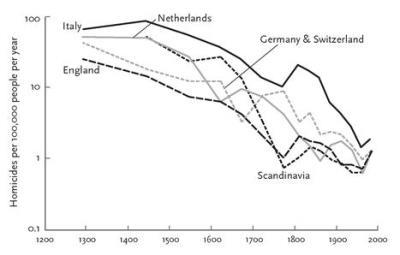 The emotionally-laden coverage of today’s news hides the fact that homicides and wars have reached an historical low point. Steven Pinker shows that this observation that violence has decreased dramatically has happened simultaneously in many dimensions:
The emotionally-laden coverage of today’s news hides the fact that homicides and wars have reached an historical low point. Steven Pinker shows that this observation that violence has decreased dramatically has happened simultaneously in many dimensions:
wars (civil wars and wars between entities)
homicide and other day-to-day violence
punishment by the power in place
family-related violence
violence against minorities, gays, racial etc.
In our societies, it is 50 to 100 times less probable to be the victim of a homicide than a few centuries ago. In many primitive societies, 50% of people die violently.
I think we need to put in perspective the continuous flow of atrocious information that is fed on us. Of course, what is happening in Syria or elsewhere is terrible, but it is bloated out of proportion by manipulations from all sides.
The world is becoming a better place, Europe has never had 70 years without war for ages, and this will continue to be the trend in the Collaborative Age, with increasing networking and trade between us.
The book is quite long and detailed, alternatively, a video presentation by Steven Pinker is available on Youtube.

September 26, 2015
How We Are Becoming Much More Intelligent With Each Generation
I discovered recently the Flynn Effect, the fact that our average intelligence (as measured by the IQ test) has increased dramatically in the last decades in developed countries.
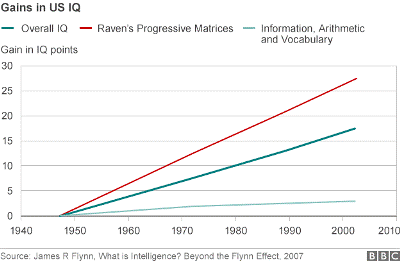 The IQ test is periodically calibrated to have an average of 100 and a standard deviation of 15 points. In many developed countries, the average IQ has increased by 20-30 points over the 20th century: measured as of today, our ancestors one century ago would have been considered mentally retarded (and so possibly also our grandparents).
The IQ test is periodically calibrated to have an average of 100 and a standard deviation of 15 points. In many developed countries, the average IQ has increased by 20-30 points over the 20th century: measured as of today, our ancestors one century ago would have been considered mentally retarded (and so possibly also our grandparents).
There are many reasons proposed for this change, the most convincing being better formal education. Also, we now know that IQ only measures one kind of intelligence, and there are other forms which are as important for predicting success and social abilities.
Some recent observations would tend to show rather a stagnation of even a diminution of the average IQ in the last decade, still to be confirmed, and still to be linked with the kind of questions that are asked in the IQ test which only measure a partial side of intelligence. Still, 20th century schooling has shown a dramatic ability to improve the capability it intended to improve!
Anyway, what I find very interesting here is that it appears that our modern habits of mind and education seem to have made us much more adapted to dealing with certain kind of problems that require abstract thinking. What is amazing is the magnitude of the change over 2 generations!
For more information, watch the TED talk by James Flynn on YouTube

September 24, 2015
How to Improve the Effectiveness of Complex Problem-Solving Teams
We’ve already established in this blog that an effective team is the best way to tackle complexity. There appears to be one additional condition: the team must be complete when it meets to resolve a situation.
 According to Michael Marquardt in the book ‘Optimizing the Power of Action Learning’, “Putnam (2000) notes that the most complex problems can be solved only by a group that has developed a strong social bonding. Therefore, it is much better that the group meets fewer times when everyone is present than more times when one or more of the members may be absent”
According to Michael Marquardt in the book ‘Optimizing the Power of Action Learning’, “Putnam (2000) notes that the most complex problems can be solved only by a group that has developed a strong social bonding. Therefore, it is much better that the group meets fewer times when everyone is present than more times when one or more of the members may be absent”
I have observed that when people are missing it certainly influences the effectiveness of the process. This warning also implies that problem-solving teams be of a limited size so as to make it workable.
Increase definitely the effectiveness of complex problem solving by insisting on the attendance of everybody in the problem-solving team!

September 22, 2015
How to Easily Check If Data from Complex Systems is Tampered With
Benford’s law is a great way to quickly check if data from complex systems (obeying typically to a power law distribution over several orders of magnitude) has been tampered with.
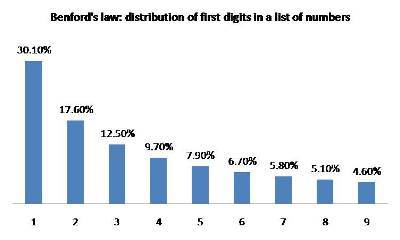 An illustration of Benford’s law
An illustration of Benford’s lawAccording to this law, the first number of the dataset must follow a logarithmic law, and there must be much more ‘1’s than ‘9’s. This is contrary to intuition, and when people generate fake numbers they will tend to spread them more evenly.
In an interesting Guardian article ‘The special trick that helps identify dodgy stats’, studies are mentioned that showed that when applied to the macroeconomic data from countries, this simple test showed that Greece’s was quite questionable!
When questioning a dataset next time, use Benford’s law to easily check whether the data could be suspicious!

September 19, 2015
Why You Should Always Look Far Ahead
In life we need to look far away at our goals and intent to keep balance and keep our position with respect to our reference.
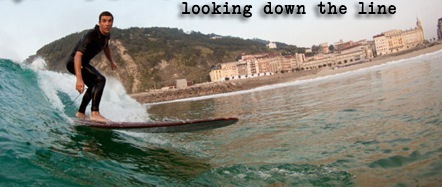 This summer I took some surf classes and I got some advice which I had already heard a number of times previously in other instances: to keep standing up, don’t look at your feet, but always look far ahead. Then you’ll get balance and direction.
This summer I took some surf classes and I got some advice which I had already heard a number of times previously in other instances: to keep standing up, don’t look at your feet, but always look far ahead. Then you’ll get balance and direction.
It was the same when I was flying gliders close to the mountains: instead of looking whether your wingtip touches the cliff, look far ahead and you’ll find the right distance from the mountain.
I like this image because I think it is also applicable to life. We’re in life moving with some speed in a difficult environment, with obstacles around. We’re not static! And we need to keep balance. If we look to close, or if we look to what we think is the danger, we will lose balance and fall. We need to look far away to keep good references as to our actual situation.
Keep looking far, it is the secret for balance.

September 17, 2015
How We Can’t Escape Being Tracked and Photographed
With the Fourth Revolution, we can’t escape being photographed, recognized and tagged. Lately I was waiting to cross a street in Singapore when a Google Car passed by – and there am I on Google Streetview. My face is blurred but I remain quite recognizable!
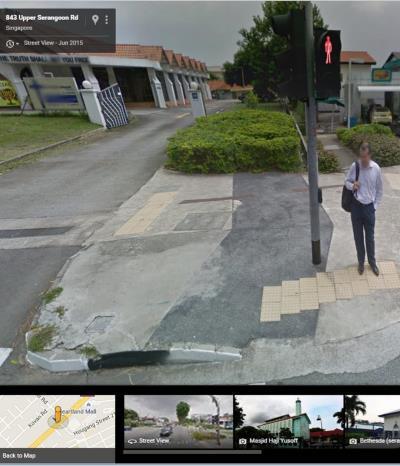 Me waiting to cross a street in Singapore – on Google Streetview!
Me waiting to cross a street in Singapore – on Google Streetview!Often on the streets we meet people taking pictures with their phones and it is quite certain that we must be in the background of numerous shots. Face recognition algorithms (such as Facebook’s) have certainly identified us in many situations, not to mention the public video surveillance systems.
Public space is more public than ever, and broadcast worldwide. Even private space is not so safe (I am surprised by the number of people in Asia who constantly cover the video camera of their laptop for fear of pirates shooting videos!). Many videos and sound tracks leak that are taken in otherwise supposedly private meetings.
That’s definitely a trend we can’t escape. I understand people are anxious with this change in particular if they’re caught in an unsuitable situation. Personally it makes me sometimes uneasy to think that in theory, someone could certainly track in detail my whereabouts (not to mention the GPS on the phone I carry). On the other hand, it can also be enhanced safety compared to the situation years ago.
As with everything, we will need to learn how to put safeguards and take advantage of the phenomenal advantages of modern technology. This one might be tougher as it visibly enters our private life.

September 15, 2015
How Creativity and Productivity Are Seasonal
“Remember that creativity and peak productivity are seasonal: there’s a time to plant and a time to harvest” writes Robin Sharma.
 I think it is true that it is quite impossible to stay hyper creative and productive all time; we need downtime and resourcing. We also need to consciously take time for reflection and refocus.
I think it is true that it is quite impossible to stay hyper creative and productive all time; we need downtime and resourcing. We also need to consciously take time for reflection and refocus.
Contrary to natural seasons, the seasons hinted at by Robin Sharma develop along different timeframes – and intermingle. The most important timeframes are:
intra-day,
in our weekly rhythm, between week-days and week-end,
and finally over months or years.
And as Robin Sharma reminds us, we also need to be able to plant today to hope for reaping later. Investment in creativity and production is sometimes tough and costly, and remains necessary.
Do you give yourself time for downtime, reflection, and planting seeds that could eventually grow into full fledged harvest?




